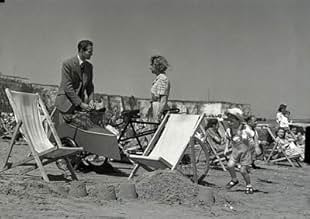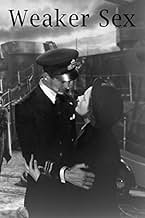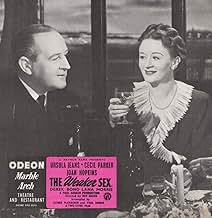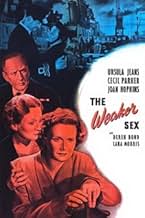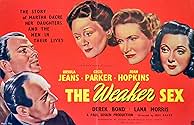Aggiungi una trama nella tua linguaA mother struggles to maintain normalcy at home as D-Day nears. With lodgers, absent children in the Navy, and no war job, she questions her choice to remain a housewife when her son's ship ... Leggi tuttoA mother struggles to maintain normalcy at home as D-Day nears. With lodgers, absent children in the Navy, and no war job, she questions her choice to remain a housewife when her son's ship is damaged.A mother struggles to maintain normalcy at home as D-Day nears. With lodgers, absent children in the Navy, and no war job, she questions her choice to remain a housewife when her son's ship is damaged.
- Regia
- Sceneggiatura
- Star
- Premi
- 2 vittorie totali
Basil Appleby
- Seaman Taylor
- (non citato nei titoli originali)
Clement Attlee
- Self
- (filmato d'archivio)
- (non citato nei titoli originali)
Dorothy Bramhall
- Mrs. Maling
- (non citato nei titoli originali)
Winston Churchill
- Self
- (filmato d'archivio)
- (non citato nei titoli originali)
Helen Goss
- Woman in Silk Stockings Queue
- (non citato nei titoli originali)
Recensioni in evidenza
This small scale English movie was beautifully crafted by talented hands behind & before the camera. Notably, cinematographer Erwin Hillier, (whose b & w night scenes were beautifully composed and lit here), and a familiar and likable cast headed by Ursula Jeans and Cecil Parker added to this ironically titled film. Set around the central event of D-Day preparations and the aftermath of all the concentrated activity on the war, it demonstrated the emotional ripples on such events throughout the lives of the characters, centering on the household of Jeans, her children, and the military service personnel who come in and out of their lives as boarders during the war.
While some might dismiss this as a trite movie about inconsequential people in a great turning point in history, the strength of this film is that detailed, largely domestic focus on the wartime anxieties, hard work and, of course, usually stoic British attitudes toward the war. This was heightened by the skilled filmmakers' ability to show the emotional ebbs and tides surging beneath the seemingly placid surface of the characters' lives. One illustration of this was the work of character lead Cecil Parker as a middle aged naval officer and widow Ursula Jeans as they quietly realized that their platonic friendship was deeper than either had fully realized.
While some might dismiss this as a trite movie about inconsequential people in a great turning point in history, the strength of this film is that detailed, largely domestic focus on the wartime anxieties, hard work and, of course, usually stoic British attitudes toward the war. This was heightened by the skilled filmmakers' ability to show the emotional ebbs and tides surging beneath the seemingly placid surface of the characters' lives. One illustration of this was the work of character lead Cecil Parker as a middle aged naval officer and widow Ursula Jeans as they quietly realized that their platonic friendship was deeper than either had fully realized.
"The Weaker Sex" is two things. Firstly it is a tribute to the British housewife ("To those who also served, though they were too busy to stand and wait"). Secondly it is a look at contemporary (1948) history through the eyes of a middle-aged housewife.
Though both these goals are admirable, the way they were carried out made a lopsided and rambling film. The first half of the picture, which takes place from D-Day to VE Night, shows a family under the stress of war. The incidents which fill this part of "The Weaker Sex" - air raids, lost and wounded brothers and sons, D-Day landings - are exciting enough to mask the fact that there isn't really any overarching plot, and the characters are going nowhere.
However the second half of the movie, which takes place in the postwar "Age of Austerity" doesn't have this built-in excitement factor. While watching a family coping with peace and the aftermath of war should have been interesting, if only for the novelty value, this half of the picture felt like an epilogue to the real movie. It is possible, even probable, that real life felt like this after the war, but sometimes reality doesn't
Perhaps there was a third purpose behind this movie. On the whole all the characters in "The Weaker Sex" are nice people: decent, doing their duty, law abiding, and not inclined to grumble. Given the era it was made in, it was perhaps intended to boost morale by reminding people how lucky they really were - that though times were hard they had peace, freedom and hope for the future.
Though both these goals are admirable, the way they were carried out made a lopsided and rambling film. The first half of the picture, which takes place from D-Day to VE Night, shows a family under the stress of war. The incidents which fill this part of "The Weaker Sex" - air raids, lost and wounded brothers and sons, D-Day landings - are exciting enough to mask the fact that there isn't really any overarching plot, and the characters are going nowhere.
However the second half of the movie, which takes place in the postwar "Age of Austerity" doesn't have this built-in excitement factor. While watching a family coping with peace and the aftermath of war should have been interesting, if only for the novelty value, this half of the picture felt like an epilogue to the real movie. It is possible, even probable, that real life felt like this after the war, but sometimes reality doesn't
Perhaps there was a third purpose behind this movie. On the whole all the characters in "The Weaker Sex" are nice people: decent, doing their duty, law abiding, and not inclined to grumble. Given the era it was made in, it was perhaps intended to boost morale by reminding people how lucky they really were - that though times were hard they had peace, freedom and hope for the future.
This movie could easily have been an unmitigated disaster -- no plot to speak of, not much in the way of memorable dialog, the uneasy feeling a viewer has nowadays that it's all a great big stiff-upper-lip and tally-ho-for-rationing exercise. What saves it is the transcendent acting -- lines spoken so perfectly, body movements so in sync with the spirit of the situations -- and a sure sense of editing that keeps the story (slim pickins as it is) moving. So what have we here, after all's said and done? I think we've been given a good postcard for future generations, a card which says, "Yes, this is how it was; this is how we got through it all. We behaved well toward one another, and we all came out of it all right." I often stop movies to take breaks if they seem a little long-ish. This one played right through to the end, and I was sorry to see it finish. I could have spent much more time with these lovely people.
This is rather a strange film with an even stranger title.The film has a substantial amount of newsreel film intercut with the drama.Also there are newspaper headlines shown often when they seem to be of little dramatic point.Cecil Parker and Thora Bird steal the acting honours.I do wonder what contemporary audiences would have made of this film.Particularly being reminded of the austerity that everyone was having to suffer.Films like this were far better made during the war.
Cheap-looking, studio-bound and obviously based on a play, but it looks good and is to be cherished as a very rare film lead for the charming Ursula Jeans.
Lo sapevi?
- QuizMartha Dacre quotes from "Life a duty" by Ellen Sturgis Hooper (February 17, 1812 - November 3, 1848): "I slept, and dreamed that life was Beauty; / I woke, and found that life was Duty."
- Curiosità sui creditiOpening credits prologue: The story of Martha Dacre and her family covered the period of four years from D-Day onwards . . .
It might have been your story.
- ConnessioniReferenced in The Good Life: The Weaker Sex? (1975)
- Colonne sonoreThese Foolish Things (Remind Me of You)
(uncredited)
Written (1936) by Eric Maschwitz and Jack Strachey
Sung by Cecil Parker in opening scene
I più visti
Accedi per valutare e creare un elenco di titoli salvati per ottenere consigli personalizzati
Dettagli
- Tempo di esecuzione1 ora 24 minuti
- Colore
- Proporzioni
- 1.37 : 1
Contribuisci a questa pagina
Suggerisci una modifica o aggiungi i contenuti mancanti

Divario superiore
By what name was The Weaker Sex (1948) officially released in India in English?
Rispondi
